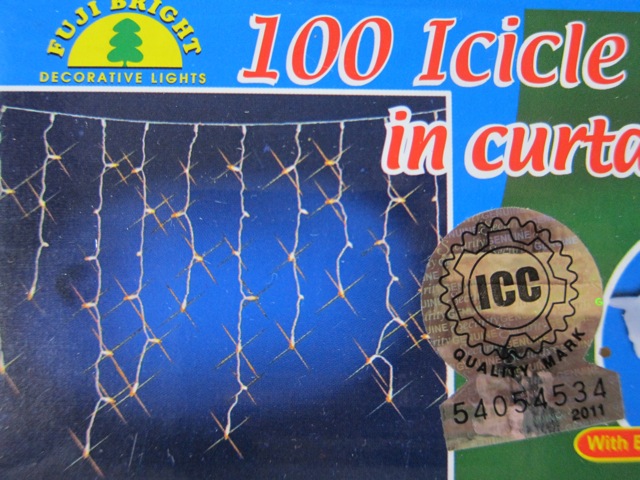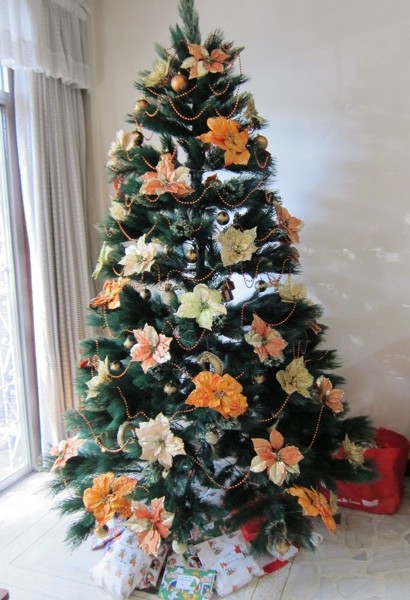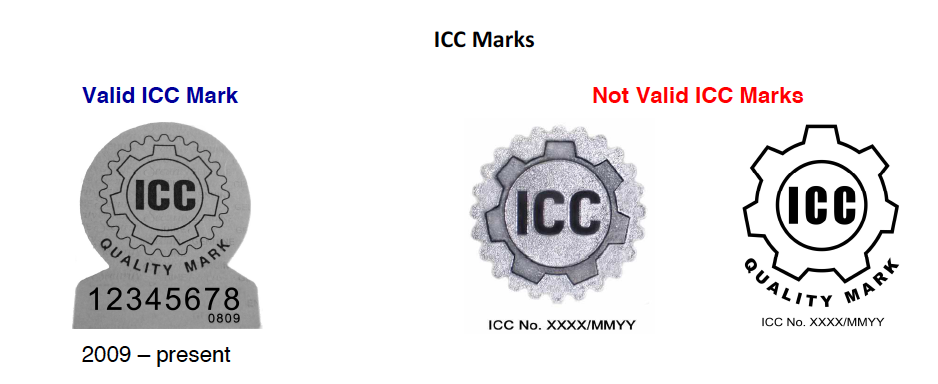This Christmas I am doing something totally different. I am going Christmas lights-less INSIDE the house.
I love Christmas lights and for many, many years, my tree was filled with them. Not only that. The bannisters of my stairs where I had strung evergreens, was also lighted up. But after all the horrific Christmas fire stories I have read over the years, I realized that I could be putting my family at risk with this practice. For example, what if the lights along the stairs shorted and a fire started there? We would be trapped on the second floor with no means of escape.
The only concession I have is outdoor lights which I purchased for our gate. And I made sure all the boxes bore the Import Commodity Clearance (ICC) sticker that signifies it has passed inspection.
This is what my Christmas tree looks like as of now. If I find the time to brave Manila traffic, I just may add a bit more decor. But for now, I’m focusing on making the tree bright without having to add lights.
But if you really want to brighten up your home with Christmas lights indoors, here are some tips I got directly from the Department of Trade and Industry (DTI) website (emphasis is mine):
- Check for the ICC Mark or the Import Commodity Clearance Sticker.Christmas lights with ICC marks mean they passed the mandatory safety tests of DTI. Thus, make them safe and reliable to use.
- Beware of fake ICC Mark Stickers. Genuine ICC stickers are not pre-printed on the packaging of the products. A genuine ICC mark is a foil-like hologram sticker which bears the ICC seal and the serial number and year of certification.
- Check for the year of certification on the ICC sticker. The latest ICC stickers were issued from 2009 onwards. Products with ICC marks issued before 2009 may have already deteriorated in quality and are not safe to use.
- Check the packaging. It should have the complete name and address of the importer or distributor, rated voltage and wattage of the set, rated voltage and wattage of the lamps, the words “For indoor use only”, the batch/lot code and bar code, brand name, the standard used (PNS 189:2000) and country of origin of the package.
- Check the outside diameter size of the wire. This should be 1.5 millimeters in diameter.
- Avoid connecting multiple sets of Christmas lights. Up to three (3) 50-bulb sets of Christmas lights may be connected and up to two (2) for 100-bulb set of lights.
In another press release, the DTI added further announcements regarding Christmas lights (excerpt below, emphasis is mine):
A set of Christmas lights is a regulated product under the DTI-Bureau of Product Standards (DTI-BPS) Product Certification Scheme (Annex A). It requires the manufacturers and importers or distributors of this product to secure the Philippine Standard (PS) license or the Import Commodity Clearance (ICC) certificate, respectively, based on the Republic Act 4109 (Standards Law), the Department Administrative Order No 01:1997 and DAO 05:2001.
Please take note, however, that the DTI-BPS has not awarded the PS license to any manufacturer since 2007. Therefore, no sets of Christmas lights with the PS mark should be found in the market.
As of 08 November 2011, the DTI-BPS has issued the ICC certificate to 16 importers/distributors with 26 brands (Annex B) to use the ICC mark on the packages of their sets of Christmas lights. The sets of Christmas lights of these importers are certified by the DTI-BPS to be reliable and safe to use. Moreover, the DTI declared that only those importers that have been issued the ICC certificate from 2009 to present could sell their sets of Christmas lights with the ICC marks (Annex C). Thus, no sets of imported Christmas lights with 2008 or earlier than this year when the ICC was issued should be found in the market.
The DTI also cautions buyers to check for the valid ICC seal. I got this photo from one of their downloadable forms that shows the valid ICC seal compared to the invalid ones.

For DTI-certified Christmas lights, click HERE
To tell a valid ICC mark apart from fake ones, click HERE
Have a safe Christmas season, everyone!



thanks for sharing these important info Jane!
We also love to add lights during the holidays but we never keep them plugged the whole night — to be safe, and to save on electricity too! 🙂
You’re welcome, @mymomfriday!